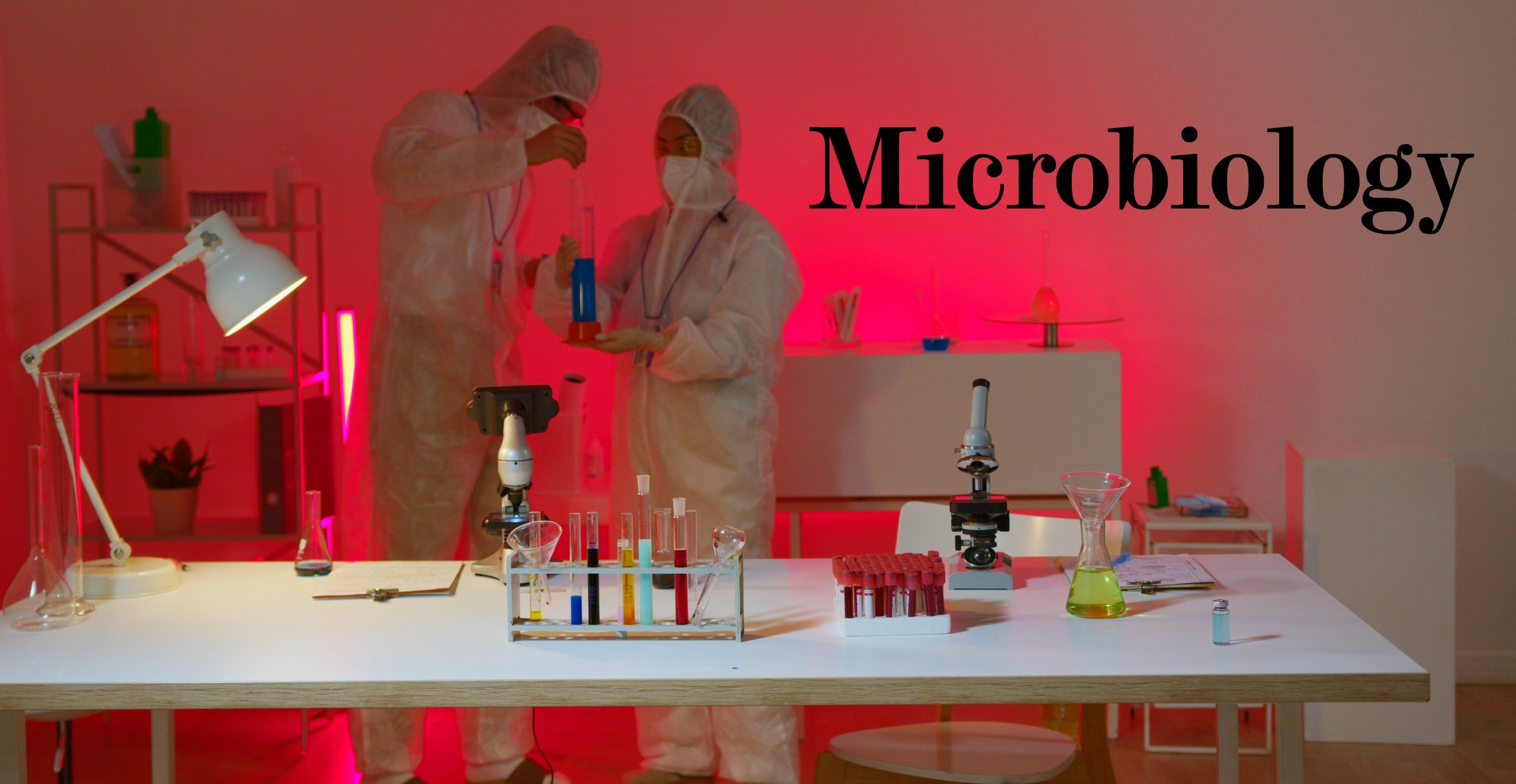The students of Biology, who want to study Microbiology at the undergraduate, graduate, or Master’s level, can check Microbiology Career Scope in Pakistan. Complete detail is available about the career and scope of Microbiology, including job nature, requirements, courses, admission, salaries, and skills. Microbiology studies microscopic organisms, such as bacteria, viruses, Achaea, fungi, and protozoa. This discipline includes fundamental research on the biochemistry, physiology, cell biology, ecology, evolution, and clinical aspects of microorganisms, including the host response to these agents.
[lwptoc]
Microbiology studies microorganisms and infectious agents that are too small to be seen with the naked eye. This includes bacteria, fungi, and algae. Viruses, though not strictly classed as living organisms, are also studied. Microbiology is a broad discipline that covers several important areas like virology, mycology, parasitology, bacteriology, etc. Although some of the microbes cause infectious diseases, they are also necessary for the production of bread, cheese, antibiotics, vaccines, vitamins, enzymes, and many other important products and processes.
Microbiology Career in Pakistan
Microbiology career is one of the emerging and highly paying careers in Pakistan. A microbiologist is a scientist who studies microscopic life forms and processes. This includes the study of the growth, interactions, and characteristics of microscopic organisms such as bacteria, algae, fungi, and some types of parasites and their vectors. Most microbiologists work in offices and research facilities, both in private biotechnology companies and academia. Most microbiologists specialize in a topic within microbiology, such as bacteriology, parasitology, virology, or immunology.
Microbiologists generally work in some way to increase scientific knowledge or utilize that knowledge to improve outcomes in medicine or some industry. For many microbiologists, this work includes planning and conducting experimental research projects in a laboratory setting. Others may have a more administrative role, supervising scientists and evaluating their results. Microbiologists working in the medical field, such as clinical microbiologists, may see patients or patient samples and do various tests to detect disease-causing organisms.
Responsibilities of Microbiologists
- Focus on understanding, managing, and improving soil and water resources.
- Investigate microscopic organisms’ growth, structure, development, and other characteristics and their relationship with their environment.
- Observe the action of microbes on living tissues of plants and animals and dead organic matter.
- Study the structure and function of human, animal, and plant tissues, cells, pathogens, and toxins.
- Examine physiological, morphological, and cultural characteristics using a microscope to identify and classify microorganisms in human, water, and food specimens.
- Isolate and maintain cultures of microorganisms in prescribed or developed media, controlling moisture, aeration, temperature, and nutrition.
- Observe the action of microorganisms upon living tissues of plants, higher animals, and other microorganisms, and on dead organic matter.
- Work in several areas such as Medical, Agriculture, Industry, etc.
- Medical microbiologists inspect the role of microorganisms in human and animal diseases and try to find ways to prevent and cure these diseases.
- Agricultural microbiologists investigate the role of microorganisms in soil fertility and spoilage of farm products and plant diseases caused by microbes.
- Those working in the industry use microorganisms to produce such products as amino acids, alcoholic beverages, antibiotics, citric acids, and Vitamin C.
- General Microbiologists study the basic features of microorganisms, including ecology, genetics, metabolism, physiology, and structure.
- An emerging field is marine microbiology which focuses on the vast number of ocean microorganisms.
Microbiology lab course
The Microbiology with Lab course provides a comprehensive introduction to the fundamental concepts and principles of microbiology. Students explore the world of microorganisms and gain insights into their interactions with humans and the environment. Through laboratory experiments, students acquire practical skills in handling and studying microorganisms, including techniques for culturing, staining, and observing them under microscopes.
This course delves into various topics such as microbial structure and function, microbial growth and metabolism, microbial genetics, and the role of microorganisms in infectious diseases, immunity, and environmental processes. It serves as a foundation for further studies in microbiology and enables students to understand the intricate relationships between microorganisms and their living and non-living surroundings.
Qualification Requirements
Entry-level microbiology jobs generally require a bachelor’s degree in microbiology or a related field. These degree programs frequently include Chemistry, Physics, Statistics, Biochemistry, and genetics courses, followed by more specialized courses in sub-fields of interest. Many of these courses have laboratory components to teach trainees basic and specialized laboratory skills.
Higher-level and independent jobs like a clinical/Medical Microbiologist in a hospital or medical research center generally require a master’s in Microbiology along with a Ph.D. in any of the life sciences (Biochemistry, Micro, Biotech, Genetics, etc.) as well as several years experience as a microbiologist.
This often includes time spent as a postdoctoral researcher, wherein one leads research projects and prepares to transition to an independent career. Postdoctoral researchers are often evaluated largely based on their record of published academic papers and recommendations from their supervisors and colleagues.
In certain sub-fields of microbiology, licenses or certifications are available or required to qualify for certain positions. This is true for clinical microbiologists and those involved in food safety and some aspects of pharmaceutical/medical device development.
Microbiology Research and Specialization
It’s a very wide subject which has following pure and applied branches, and You may do specialization and find a job in all these fields. Virology, Mycology, Parasitology, Evolutionary microbiology, Physiology, Bacteriology, Immunology, Medical Microbiology, Environmental Microbiology, Soil microbiology, Food microbiology, Microbial cytology, Microbial ecology, Microbial genetics, Protozoology, Microbial genetics, Hematology, Cellular microbiology, Microbial physiology, Evolutionary microbiology, Molecular microbiology, Aero-microbiology, Cellular microbiology, Microbial taxonomy, Nano microbiology, Pharmaceutical microbiology, Microbial biotechnology, Microbial systematic, Systems microbiology, Generation microbiology, Astro-microbiology, Biological agent, Industrial microbiology, Agricultural microbiology, Plant pathology, Veterinary microbiology, and Water microbiology. Still, this list is not final, and we will try our best to write detailed articles on the scope of these branches.
Microbiology Career in Pakistan Scope and Jobs Opportunities
Microbiologists work in laboratories located in research organizations, hospitals, food and beverage industries, and pharmaceuticals firms.
Microbiology course fees
The Microbiology course typically spans a duration of 3 years. During this time, students engage in in-depth studies and practical training to develop their understanding of Biotechnology. In terms of cost, the average annual course fees for Microbiology range from 50,000 to 200,000 rupees. The fees may vary depending on the institute or university offering the program. It is advisable for students to research and compare the fees of different institutions to make an informed decision based on their budget and preferences.
Microbiology Scope in Pakistan
With the advancement of science and technology, the scope of microbiology in Pakistan is increasing daily. It is dominating in almost every field of life. This is one of the best fields to pursue science subjects. It has a very demanding scope and going high and high over time, not only in Pakistan but all over the globe. A microbiologist can easily get the employee in any one of the below-listed job areas
- Pathology Labs
- Biotechnology Firms
- Chemical Industries
- Veterinary Labs
- Food and nutrition-based Companies
- Poultry Industries
- Beverages Industries
- Pharmaceutical Firms
- Dairy Farms
- Agriculture Sectors
- Research Departments
- Consulting firms
Major Subjects in Microbiology
The Microbiology covers following major subjects:
- Microbial Anatomy and Physiology
- Cell Biology
- Bacterial Genetics
- Clinical Bacteriology
- Soil Microbiology
- Epidemiology
- Environment Biotechnology
- Genetic Engineering
- Medical Virology
- Immunology
- Food Microbiology
Check also: Medical Imaging Technology Career in Pakistan
Salary of a Microbiologist
Microbiology captivates students in Pakistan due to its practical applications and promising job prospects. The country’s scientific and technological advancements have fueled the expansion of microbiology, making it an attractive field of study for aspiring scientists. Microbiologists work in diverse settings such as offices, research facilities, and laboratories, specializing in areas like bacteriology, parasitology, and virology. They contribute to scientific progress and find employment in sectors such as pathology labs, biotechnology firms, pharmaceutical companies, and agricultural sectors, among others.
A career in Biotechnolog offers professional growth, societal impact, and rising demand for skilled professionals, ensuring exciting opportunities. In Pakistan, the average annual salary for a microbiologist is PKR 420,000, with potential for higher earnings through experience and skill development. Microbiology combines intellectual fulfillment with financial stability and upward mobility. Embrace microbiology in Pakistan and unlock boundless possibilities.
Future of Microbiology Career Job
Universities and Colleges are offering Microbiology in Pakistan
- Abbottabad University Of Science And Technology. Abbottabad.
- Women University Azad Jammu & Kashmir. Bagh.
- Bacha Khan University.
- Gomal University.
- Fata University.
- Government College University.
- University Of Agriculture.
- Karakuram International University.
Best Job after microbiology
- Research associate.
- Biomedical scientist.
- Microbiologist.
- Pharmacologist.
- Ecologist.
- Science writer.
- Food technologist.
Microbiology career syllabus
The BSc Microbiology course syllabus covers a range of core subjects that provide a comprehensive understanding of the field. Students delve into topics such as Microbial physiology, Genetics engineering, and Molecular biology, which explore the intricacies of microorganisms and their functions. They also learn about Immunology, which focuses on the immune system and its response to pathogens.
Additionally, subjects like Bioinstrumentation and Computer Biology & Bioinformatics equip students with the necessary skills to utilize advanced technologies in microbiology research. Industrial Microbiology introduces students to the practical applications of microbiology in industries, while Bi-Statistics enhances their understanding of statistical analysis in biological research.
These subjects collectively offer a well-rounded education in microbiology, preparing students for various career opportunities in the field.
Benefits of studying microbiology
Due to its contributions across a range of fields, Biotechnology is of utmost importance in biology. As a result, we may create efficient therapies and preventative measures by comprehending the methods through which microbes cause illnesses.
By using the potential of certain microbes for procedures like fermentation, the creation of biofuels, and the manufacture of enzymes, microbiology also plays a crucial part in biotechnology and industrial applications.
In addition, microbiology aids in our understanding of the intricate relationships that exist between microbes and their surroundings, including their functions in nutrient cycling, environmental cleanup, and agriculture. Overall, microbiology has an influence on business, healthcare, and ecological knowledge, making it an important area of research in the science of biology
Microbiology Job Salary In Pakistan
When commencing a career in the realm of Biotechnology in Pakistan, fresh graduates can expect an initial monthly remuneration of approximately PKR 30,000. It is imperative to bear in mind that the extent of compensation may fluctuate based on factors such as proficiency, aptitude, and the specific establishment or industry.
Seasoned microbiologists, armed with extensive expertise, stand the chance of attaining an annual income nearing the impressive sum of PKR 1 million. It is worth noting that specializing in a particular domain and continuously honing one’s professional skills can significantly augment the potential for financial gains within the realm of microbiology.
FAQs
- What is the scope of microbiology?
- Which degree is best for microbiology?
- Which subject is best for BSc microbiology?
- What is syllabus in microbiology?
- Is there math in microbiology?
Microbiologists regularly use complex mathematical equations and formulas in their work. Therefore, they need a broad understanding of math, including calculus and statistics.

